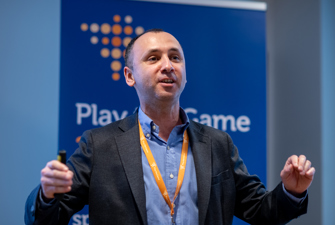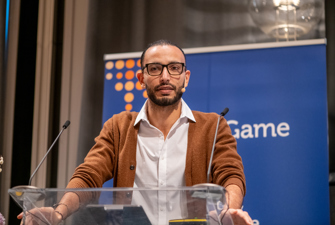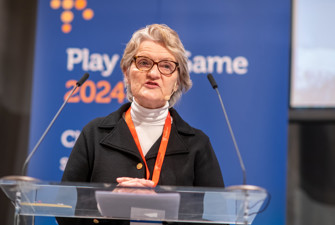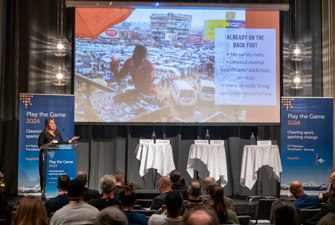Sports federations urged to do more to safeguard athletes
A session at Play the Game 2024 outlined several problems when it comes to protecting athletes. Research shows that many athletes do not report cases of sextortion and inappropriate behaviour because they believe nothing will be done, and Global Athletes called IOC safeguarding processes inadequate.
Many sports federations are still not adhering to basic safeguarding principles, a number of speakers argued in a session about safeguarding athletes at Play the Game 2024.
Athletes and those working with them should be taught to recognise signs of distress, while trained responders should be available to advise athletes on the reporting process. The causes of abuse should be defined and addressed, and sports authorities should not shy away from their responsibilities.
Safeguarding processes under the IOC are inadequate
“There are plenty of good people at the IOC, and I’m not pointing a finger at anyone,” said Rob Koehler, who is director general of Global Athlete Canada.
“But as we see it, the safeguarding processes under the IOC are inadequate. They lack independence. There can be long delays for athletes who go through the system. Athletes must often tell the same story five, six times or more. When victims do come forward, there is often little or no support. Where are the athletes’ advocates who can help guide them through the process?" he asked and pointed out that sport authorities have lots of support:
"They have lawyers to back them up. We also see that there is still no global registry of abusers. We have an example of a coach who moved from Australia to the UK and continued his abuse there.”
“We see conflicts of interest everywhere,” Koehler said. “Sport is still trying to self-regulate, to protect its brand. Athletes are not satisfied with the existing processes. We have people who have reported abuse who have been silenced. We need to look at how we can do things better.”
Koehler referred to the recommendations of a new Canadian Safe Sport Thinktank which found that safeguarding policies are too often centred on a small percentage of elite athletes.
A focus on national prestige and medals can increase the risk of exploitation, it found, while a desire to protect the brand can lead to conflicts of interest. It recommended that independent athlete representation be made available throughout the reporting process and called for a national enquiry into abuse that would provide an example to the rest of the world.
Fewer than one in five report cases of sextortion
Whitney Bragagnolo, a PhD researcher at Charles University in Czechia, detailed a new study she is doing together with Yaneí Lezama at Western University, into so-called sextortion, where abusers use their power to obtain a sexual benefit or advantage. Practised by coaches, sponsors, government officials and others in positions of authority, it involves coercion as opposed to physical violence.
Most existing data on the issue, Bragagnolo said, is drawn from English language sources and English-speaking regions, which overlooks athletes’ experiences in the global south.
“You must avoid oversimplification, a one-size-fits-all approach,” she said.” We need to offer a tailored response. A deeper understanding is needed.”
Her study was conducted in English and Spanish in 49 different countries and attempted to explain why victims choose not to report. Respondents from 41 countries had been impacted by sextortion, the study found, but fewer than one in five had reported their experience through official channels.
Reasons for non-reporting varied across gender, ethnicity and location. However, all included a lack of belief that something would be done and a fear of negative career repercussions.
“We must ask if we are protecting the most vulnerable people,” Bragagnolo said.
“It is the global north setting the agenda. Data from diverse regions is crucial for identifying challenges and barriers. We must not leave other groups behind.”
The complexities of creating safeguarding processes
Claudia Villa, an independent safeguarding specialist, described the complexities of creating safeguarding processes at mega events. Overall responsibility to safeguard everyone in the event must be defined well before it begins, she said and detailed the many actors and interests around mega events:
“You have the international federations, the national governing bodies, the national teams, the local organising committee, and the event owners such as the IOC,” she said.
“Then you have local legislation which sometimes contradicts your policies, for example when defining the legal age of a child. And you have the people – the organisers, the volunteers and the contractors, who must be vetted and trained.”
“You need to start safeguarding processes long before the event begins and they should remain in place after the event ends,” she said.
“Clear, well-articulated policies must be in place that define and establish jurisdiction. People should be trained to recognise when something is wrong, and victims should always be able to contact someone who knows how to respond. The reporting process should be clear and accessible to all.”
Inappropriate behaviour considered part of the culture
Marko Kananen, research manager at the Finnish Center for Integrity in Sports, presented research where 2,000 competitive athletes were asked about their experiences of inappropriate behaviour.
Of those who had experienced such behaviour, less than half had spoken to coaches or organisations about it and only around 15 per cent felt that their issues had been resolved. Prominent among their reasons for not taking the issue any further was a perception that such behaviour was a part of the prevailing culture.
Past focus has been on “bad apples” but more recently the spotlight has been placed on the sports organisations themselves, said Marcus Mazzucco, who is an adjunct lecturer at the University of Toronto.
“Sports bodies have been shown to have poor governance, a lack of standards, asymmetric power balances, a lack of athlete representation and a 'win at all costs' ethos," he said.
While Canada already has a code of conduct which defines abuse and lays out sanctions, Mazzucco said, its scope is limited. New legislation is needed to establish an external regulator with the authority to enforce rules and standards, he concluded.







